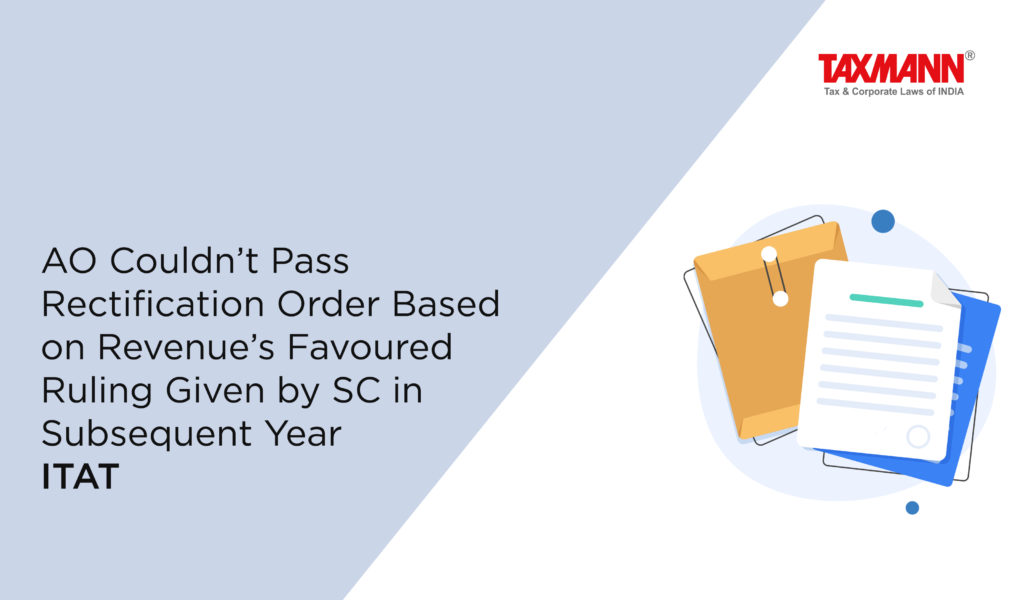AO Couldn’t Pass Rectification Order Based on Revenue’s Favoured Ruling Given by SC in Subsequent Year | ITAT
- News|Blog|Income Tax|
- 2 Min Read
- By Taxmann
- |
- Last Updated on 22 August, 2023

Case Details: Sanjay Kumar v. Income-tax Officer - [2023] 152 taxmann.com 594 (Delhi-Trib.)
Judiciary and Counsel Details
-
- Anil Chaturvedi, Accountant Member & Anubhav Sharma, Judicial Member
- M.R. Sahu, Adv. for the Appellant.
- Yogesh Nair, Sr. DR for the Respondent.
Facts of the Case
Assessee deposited the employees’ contribution to EPF and ESI after the due date prescribed in the respective Acts. Assessing Officer (AO) accepted the return filed by the assessee under section 139(1) vide intimation under section 143(1).
Subsequently, by exercising powers under section 154, the AO passed a rectification order on the assessee, disallowed the employees’ contribution to EPF and ESI, and made an addition to its income.
On appeal, CIT(A) sustained the order of the AO based on the judgment of the Supreme Court in the case of Checkmate Services (P.) Ltd. v. CIT [2022] 143 taxmann.com 178. Aggrieved-assessee filed an appeal before Delhi Tribunal.
ITAT Held
The Tribunal held that the issue involved in the instant appeal is not with regard to the merits of addition but whether the AO could make such addition by exercising powers under section 154.
The AO had accepted the return filed under section 139 vide intimation under section 143(1). The same was based on the tax audit report in Form No. 3CB and Form No. 3CD. Thus, the delay in the deposit of the employees’ contribution was very much in the assessment records upon which the intimation under section 143(1) was served upon the assessee.
As there was a law in favour of the assessee allowing such expenditure at the time, it has to be concluded that the assessee benefitted by the same and failure to follow a divergent view in favour of revenue cannot be considered an error apparent on record. Thus the AO was not justified to substitute his opinion by invoking the provision of section 154.
Therefore, the assessee’s appeal was to be allowed.
List of Cases Reviewed
-
- CIT v. Mahavir Drilling Co. [2005] 142 Taxman 663/273 ITR 201 (MP) (para 6) followed.
List of Cases Referred to
-
- Checkmate Services (P.) Ltd. v. CIT [2022] 143 taxmann.com 178/[2023] 290 Taxman 19/[2022] 448 ITR 518 (SC) (para 3)
- CIT v. Mahavir Drilling Co. [2005] 142 Taxman 663/273 ITR 201 (MP) (para 4)
- CIT v. N.C. Budharaja & Co. [1993] 70 Taxman 312/204 ITR 412 (SC) (para 6).
Disclaimer: The content/information published on the website is only for general information of the user and shall not be construed as legal advice. While the Taxmann has exercised reasonable efforts to ensure the veracity of information/content published, Taxmann shall be under no liability in any manner whatsoever for incorrect information, if any.

Taxmann Publications has a dedicated in-house Research & Editorial Team. This team consists of a team of Chartered Accountants, Company Secretaries, and Lawyers. This team works under the guidance and supervision of editor-in-chief Mr Rakesh Bhargava.
The Research and Editorial Team is responsible for developing reliable and accurate content for the readers. The team follows the six-sigma approach to achieve the benchmark of zero error in its publications and research platforms. The team ensures that the following publication guidelines are thoroughly followed while developing the content:
- The statutory material is obtained only from the authorized and reliable sources
- All the latest developments in the judicial and legislative fields are covered
- Prepare the analytical write-ups on current, controversial, and important issues to help the readers to understand the concept and its implications
- Every content published by Taxmann is complete, accurate and lucid
- All evidence-based statements are supported with proper reference to Section, Circular No., Notification No. or citations
- The golden rules of grammar, style and consistency are thoroughly followed
- Font and size that’s easy to read and remain consistent across all imprint and digital publications are applied



 CA | CS | CMA
CA | CS | CMA
